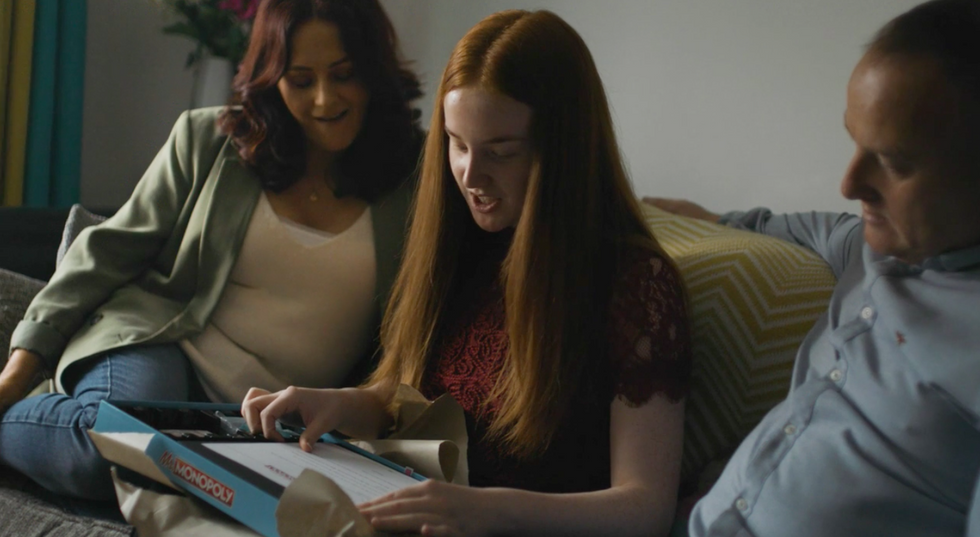
Hasbro
I have very mixed feelings about Hasbro’s Ms. Monopoly game.
I realize that those mixed feelings are entirely by design. By writing about this, I’m playing into the hands of the exact breed of late-stage capitalism that Hasbro thrives on, the same one that Monopoly’s original inventor aimed to lambaste. In fact, the history of Monopoly itself is a perfect example of the sexist culture Ms. Monopoly allegedly tries to tackle—since Lizzie Magie, a talented, innovative female game designer, had her hard work stolen by a man who took all the credit and profit (although Ms. Monopoly probably won’t cover that).
The premise behind Ms. Monopoly is simple: It’s just like regular Monopoly, except women start with $1,900 (men start with $1,500) and collect an extra $40 every time they pass Go. Also, all of the buyable spaces are replaced by inventions made by women, which players can invest in. It would be a pretty cool concept if Hasbro wasn’t so obviously looking to profit off important social issues.
After their short-lived Socialism Monopoly edition, which seemed designed to pander to alt-righters whose whole understanding of economic systems starts and ends at “LOL SOCIALISM BAD,” Hasbro wanted to get money from the left, too. So they gathered in a boardroom and had a conversation that probably went as follows:
White Male Hasbro Executive #1: “What do liberals like?”
White Male Hasbro Executive #2: “I don’t know. Feminism?”
White Male Hasbro Executive #3: “Oh right. That’s the one where people point out that our executive management team is made up of seven white men, one white woman, and zero minorities, right?”
White Male Hasbro Executive #4: “Yeah, but let’s just focus on the part about how we pay our female employees less.”
White Male Hasbro Executive #2: “So what if we made a Monopoly variant where we just pay women more than men? And call it ‘Ms. Monopoly’ because women and stuff.”
White Male Hasbro Executive #1: “It’s genius. The feminists will eat this sh*t up.”
Thus, Ms. Monopoly was born. It’s regular Monopoly, except with a “fun spin…where women have an advantage often enjoyed by men.”
And oh God, Hasbro’s marketing is just all over the place.
Right off the bat, Hasbro seems to take a reductive approach to feminism. Their new “women start with more” rule arguably propagates the old straw man argument that “feminism is about putting women above men in society!” —the one you often hear from Very Angry Men™ who don’t actually know anything about feminism.
Now contrast this messaging with the Ms. Monopoly promo spot, focusing on three teenage female inventors, each of whom Hasbro awarded with $20,580 to help fund their future projects or endeavors. To be clear, these young women—Sophia Wang, Gitanjali Rao, and Ava Canney—are doing amazing work to better the world, and even if Hasbro’s intents are less than genuine, I’m happy to see them receive public recognition.

But while the commercial tries to take a serious tone, showing the hard work and passion these teens put into their fields while simultaneously discussing the gender pay gap, it ultimately shifts to “buy this ‘fun spin’ on Monopoly!” In short, Hasbro’s corporate greed is so transparent that even when they do something that seems nice, their intentions are too transparently douchey.
Then again, if people playing a Monopoly variant whereby they start with less money than other players shocks one or two people into realizing that the gender pay gap actually exists (more so than years of research), then okay, I’ll be happy to stand corrected.
Also, I do sincerely like the idea of a Monopoly variant whereby all the purchasable spaces are real things invented by women.
With all this being said, Ms. Monopoly seems like yet another prime example of corporate wokeness, that awful aspect of late-stage capitalism with companies attempting to leverage real, important social issues for profit. That’s not to say boycott Ms. Monopoly or anything. The game’s angle of educating players about female inventions could be a great learning experience for many children, and teaching kids about the pay gap is probably a good way to help ensure that they won’t grow up into the aforementioned Very Angry Men™.
But don’t think that your $20 is going to support a cause you believe in…unless that cause is Hasbro’s profits.
- Six Songs about Fluid Sexuality More Outrageous than Ariana … ›
- The Encyclopedia of K-pop! 22 Key Players, One-of-a-Kind Stars … ›
- Snapchat is Changing the Game for Social Media – Popdust ›
- Is It Hypocritical for Lady Gaga to Sell Her New Makeup Line on … ›
- New ‘Ms. Monopoly’ game celebrates women’s empowerment … ›
- Ms. Monopoly is a new board game celebrating female inventors … ›
- Hasbro’s new Ms. Monopoly celebrates women inventors – UPI.com ›
- United States v. Microsoft Corp. – Wikipedia ›
- Ms. Monopoly Official – Monopoly – YouTube ›
- Ms. Monopoly Board Game for Ages 8 and Up – Walmart.com ›
- Hasbro takes on the gender pay gap with new Ms. Monopoly game ›
- Does the new ‘Ms. Monopoly’ fix or fuel the gender pay gap … ›
- Ms. Monopoly: Hasbro brings gender pay gap debate to game night ›
- Monopoly: In the new game, women make more than men – CNN ›













